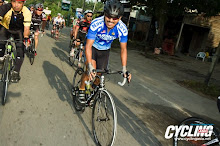Become a better runner even after you've pulled off your trainers with these quick and easy recovery tips.
In order to run at your best, your body needs time to recover between training sessions. Your hard work might end when you pull off your trainers, but your body keeps working afterwards, repairing and rebuilding muscle and gradually adapting to a regular (or increasing) training load.
Long runs, hard sessions and races also leave your immune system dramatically lowered, so knowing what to eat, drink and do immediately after exercise is vital for staying fit and healthy too.
Keep Moving
Immediately after a hard run or race, slow down to a walk rather than stopping abruptly. By keeping your legs moving - and pumping new blood to your muscles - you'll help your legs flush out waste products. Grab an extra layer of clothing too as your core temperature will drop after a run. The colder you are, the harder it is for blood to get to your muscles.
Take A Dip
Both ice baths and a relaxing hot tub can have recovery benefits. A quick cold dip immediately after your run will improve your circulation and help reduce inflammation. Save the hot bath for later, when the heat will help ease any lingering soreness.
Stretch Out
Whether you're a stretching fan or foe, you might find a gentle session beneficial after easier runs. Ease into stretches slowly - otherwise, you run the risk of damaging muscles already taxed by a tough workout. A light sports massage and/or wearing compression clothing (brands like Skins, 2XU and Under Armour) can also boost blood flow and help expel lactic acid.
Consider following a hard session with an easy recovery run or some cross-training the next day too. Non-strenuous exercise will encourage the delivery of oxygen and nutrients to tired muscles.
Drink Up
Replacing fluid lost through training is key to effective hydration. Aim to drink 500ml of water or diluted juice as soon as you get back from a run. For more precise hydration, try a sweat test. Weigh yourself immediately before and after your run - the difference will tell you how much fluid you have lost during that session. For every kilogram of weight loss, you'll need to drink approximately one litre of fluid.
Food For Thought
Eating for recovery is a long-term strategy, stretching from the first hour after a training session right through your rest days.
The first hour after a workout is the most crucial - your body replenishes glycogen at three times its normal rate immediately after exercise. This rate slows with every minute you waste. Try to eat a mix of carbohydrates and protein. Recovery drinks and energy bars are quick and easy options; alternatively, snacks like eggs on toast, fruit smoothies and tuna sandwiches all contain roughly four times as much carbohydrate as protein (the recommended ratio).
Don't neglect your nutrition for the rest of the day either. It can take up to two days to fully replace the glycogen you use during exercise. Maintaining a high-carbohydrate diet, even on non-running days, will help build your energy stores for future running.
Sleep On It
You might not need the daily naps of an elite competitor, but getting enough quality sleep should still be a priority. During deep sleep, your body releases human growth hormone (HGH) which helps build and repair muscle, and encourages the body to use more fat as fuel. Without the right amount of HGH, your recovery will be hindered and you'll take longer to increase your aerobic fitness. Disrupted sleep can also interfere with your metabolism.
Listen To Your Body
How many rest days you need will vary from one runner to the next. What's most important is being alert to any aches, pains or fatigue. A good rule of thumb is to take one easy day for each mile of a race or hard training session. Another useful measure is to check your pulse as soon as you get up. If it's 20 per cent higher than normal, take a break.
Finally…
Recovery shouldn't be complicated - it should be second nature. Take time now to incorporate these simple steps into your daily routine and trust us, your body will thank you in the long-term!
Thursday, May 21, 2009
Subscribe to:
Post Comments (Atom)


No comments:
Post a Comment